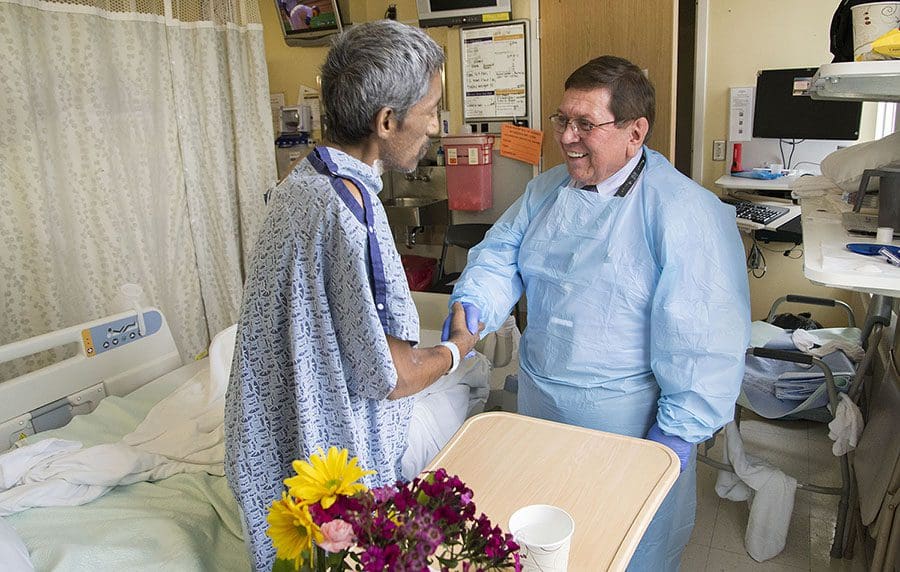When Harborview medical interpreter Jose Mayorga speaks about his life and career, he says almost apologetically, “I am a little bit outspoken.” For the many people he serves, though, no apology is needed.
Speaking on behalf of patients has always been the heart of Mayorga’s work at Harborview. “My job is to make sure that both patients and doctors understand what is going on.”
Mayorga is a skilled linguistic bridge builder who artfully navigates the many cultural and power differentials at play in his line of work. To help patients feel respected, he adds “please” when a doctor gives instructions such as “sit down” or “stand up.” To help build confidence in their skills, Mayorga asks doctors not to say, “I’m going to listen to your heart and lungs.” Because it does not take years of training to listen, his patients want to hear, “I’m going to examine your heart and lungs.”
When Mayorga senses that a patient wants to be told what to do, he asks providers to describe what they would do if the situation involved their own mother, father, sister or brother. This, he says, lets patients know their doctor is on their side, helping them make decisions.
Mayorga was born in Bogota, Columbia, and came to the United States with his wife and two children in 1984 to escape the turmoil of drug wars and kidnappings. He began working part time as a medical interpreter in 1994 and full time in 1997. A few years later, he was instrumental in organizing interpreters through SEIU 925 to gain employee status and health benefits.
For the past six years, Mayorga has been a caseworker cultural mediator in the Community House Calls program, which helps address barriers to healthcare for refugees and immigrants with limited English proficiency.
Mayorga rounds on Spanish-speaking patients in the intensive care units, continues to see them on the acute care units and follows some of them when they are discharged home for palliative care.
“I love my job,” Mayorga says. “I know that if I did something good for somebody, that was a good day.”
His good days are built on trust. “You have to get the trust of the patient and family and come up with medical plans that take into account the family’s wishes.”

He tells the story of a nursing home patient who was in a vegetative state and transferred to Harborview every time he developed an infection. While the medical team communicated directly with the patient’s wife — who by all accounts spoke English very well — they were frustrated that she did not want to end life support and could not understand why.
When Mayorga became her interpreter, he was able to establish trust with her at a different, deeper level and uncover a missing piece of information: she kept her husband alive because she depended on him for her legal status. If he died, she would be deported and separated from her children. Mayorga arranged for Harborview to support her application for residency, and she became a citizen two years later.
There are, of course, bad days as well. Last year, Mayorga lost more than 20 patients, ranging in age from 80 to seven. Mayorga hears the bad news, shares it with the family, listens to their grief and communicates it back to the providers. “It becomes personal in many ways.”
On these days, Mayorga finds comfort in his faith and his family — particularly his wife. “She is my shining star. She gave up a successful career in management to do something that would be more meaningful.”
And what was this meaningful work she decided to pursue?
She became a medical interpreter.


